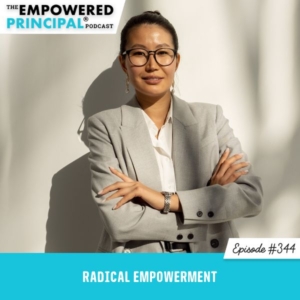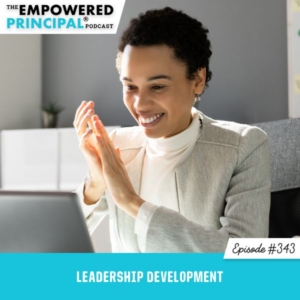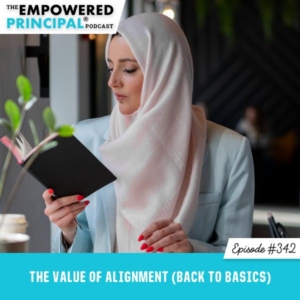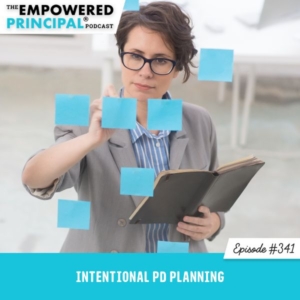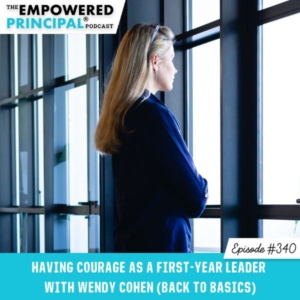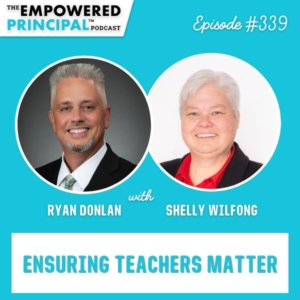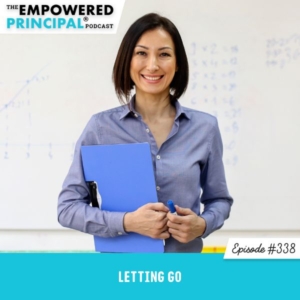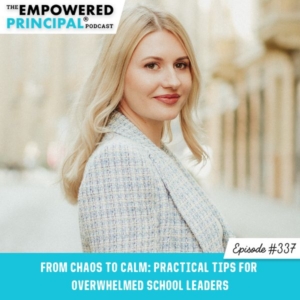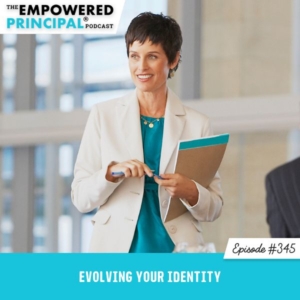
Are you ready to step into your full potential as a school leader? What is the identity that you want to develop for yourself this coming year?
Your identity is simply what you believe about yourself and what you’re capable of learning, doing, experiencing, handling, creating, and having. You can hold firm to your identity if it’s currently serving you well, but if you feel restless or stuck on repeat, it might be time for an identity shift. Today, you will learn how evolving your identity is the key to expanding your impact, productivity, and fulfillment as a principal.
Tune in this week to hear why intentionally redefining how you see yourself, what you believe you’re capable of, and who you want to become are essential for achieving your biggest goals and dreams, both professionally and personally. You will also learn a simple but transformative process for upgrading your identity so you can show up as your most empowered self.
The next round of The Empowered Principal® Collaborative starts Wednesday, September 4th 2024! This is the time to decide: do you want to lead your school for the rest of the year as you are right now, or take your leadership skills to the next level? Join us today to become a member of the only certified life and leadership coaching program for school leaders in the country by clicking here.
What You’ll Learn From this Episode:
- Why your current self-identity may limit your success and hold you back from what you truly want.
- How to discern between identities that serve you and those that don’t.
- The importance of exploring what’s possible for you rather than staying in your comfort zone.
- How to expand your identity in various areas of your life, from your role as a leader to your relationships and personal interests.
- Why believing that change is possible is the essential first step to developing new skills and achieving transformation.
- How joining a supportive community like The Empowered Principal Collaborative can help you evolve your identity and reach your full potential this school year.
Listen to the Full Episode:
Featured on the Show:
- If you’re ready to start the work of transforming your mindset and start planning your next school year, the Empowered Principal® Coaching Program is opening its doors. Click here to schedule a consult to learn more!
- For a free call to review your year, get in touch with me: Facebook | Instagram | LinkedIn
- Join The Empowered Principal® Facebook Group, Emotional Support for School Leaders, today!
- Sign up for The Empowered Principal® Newsletter
- Podcast Quick-start Guide
- Schedule a 15-minute Q&A Call with me
- Join our Facebook group to be involved in The Summer of Fun!

Full Episode Transcript:
Hello empowered principals. Welcome to episode 345.
Welcome to The Empowered Principal® Podcast, a not so typical educational resource that will teach you how to gain control of your career and get emotionally fit to lead your school and your life with joy by refining your most powerful tool, your mind. Here’s your host certified life coach Angela Kelly Robeck.
Well, hello, hello, my empowered leaders. Happy Tuesday. I hope you’re doing well. Welcome to August. Here we go. A brand new school year is underway. You are probably back at it. Most of you are. I’m inviting you into The Empowered Principal® Collaborative. Let me tell you a little bit about it because it’s so valuable. It’s so valuable that I have a hard time articulating how valuable this is.
So let me tell you a little bit about it. We’re launching right now. You can join. We start in September. I’m doing bonus workshops and trainings throughout the month of August. So you want to be in EPC to gain access, not just to a full year of coaching, but to all of the trainings and the classrooms and the modules that I’ve created, the workbooks I’ve created. You have on-demand resources available to you for the entire school year.
You get real live coaching once a week for an entire hour in a group of people who are empowered. They are so successful, so intelligent, so savvy. They have so many resources. This is a true mastermind. I do teaching. I also do mentoring, and I do coaching.
There’s no problem that you can’t bring to the table in EPC. If you have a situation you’re faced with, and you’re not sure, or you want to talk through it, or your emotions are running high, this is the group that helps you process so you can come to a clean, aligned decision to keep yourself, your school, your staff, your students moving forward.
So EPC, The Empowered Principal® Collaborative, this is the second round that I have been offering. It’s magical. I have refined so many of the processes. It’s going to ensure your success.
So just to give you a couple of things, when you start EPC, you’re going to take a self-assessment of where you’re at and where you’d like to be. We’re going to create your 90-day plan, your first three-month plan to get the first three months of the school year planned, prioritized, prepared, mapped out on your calendar.
We’re going to ensure that all the meetings, the deadlines, the appointments, all of the projects and events that are happening at your school between now and the next three months, we are intentional with how we are going to approach handling those things and completing those things and ensuring the success of those to-do items on your list. Okay? We do that.
Every 90 days, we come up. We assess the old three-month plan. We come up with a new three-month plan. That is how you get to the year. The school year is broken down into seasons. There’s a fall season, a winter season, a spring season, a summer season. I help you break down your work into four 90-day blocks of time to make it easy, doable, simple, very clear. Okay?
Then, we coach on time mastery, balance mastery, planning mastery, relationship mastery, leadership mastery, and emotional regulation mastery. So, there is a plethora of topics in each of the six pillars of EPC. Those are the six pillars. We master time, balance, planning, relationships, leadership, and emotional regulation. All of that’s included.
Communication is included in those topics, building your culture, everything to do around how you spend your minutes of the day, how you spend your time, how you spend your energy, where you spend your time and attention and focus, making sure you have balance throughout your work day, your work week, your work year, ensuring you’re getting to do the things you love.
But really, this is about building up not just your skill set, but expanding your identity as a leader. Being the leader who is successful and balanced. You can have both. Being the leader who is highly impactful but not overworked. We look for the land of and. The empowered principals live in the land of and. They have both.
Does that mean they never have bad days? Of course not. No matter what level you are in terms of your expertise as a school leader, you still will have hard days because you’re a human. They will be different kinds of hard days. In EPC, we teach you how to emotionally and mentally navigate demands, pressures, really crisis situations, really unfortunate happenings.
You are in the business of humans and lots of things happen when we’re in the business of humans. I teach you and the group supports you in how to navigate the ups and the downs and the twists and the turns of school leadership.
If ever you were going to join any kind of leadership, mentorship, coaching program, this is it. I believe we go below the surface. There are the surface things you need to do. Calendaring, master scheduling, teacher observations, hiring, firing. I teach all of that. I teach all of the doing parts and all of the planning parts and the management and all of that.
But we go below the surface to the core. This is about you designing the experience of school leadership that you want to have. It’s about giving you the power back into your own hands so that you are the one who’s designing the experience for you and for your school. You really have so much more power than you think you have.
I just got off the phone with a new client who just joined EPC. She is trying so hard, and you all are trying so hard. But this woman has children at home and she’s working until 10:00 p.m. at night. The minute she puts her head down on the pillow, her brain’s thinking about all of the work that’s still there when she has to get up and go to work the next morning.
For most of us, that is not the school leadership experience that we want. It’s not what we thought we signed up for. even if you did know it was going to be a lot of work, it doesn’t mean you want to be working your evenings away from your family, your children, your partner, your spouse. We want you to feel that you have some agency and control over your professional experience.
Because I’m a certified life and leadership coach, I help you blend and balance your life with your profession. You’re one human. There’s one human experience. You can’t separate professional development from personal development. It’s all development. It’s human development. I want to help you expand to experience the greatest experience that you can as a school leader.
So if you’re interested in EPC, you can sign up one of two ways. You can pay in full. It’s $1,997 for the entire year. You get access to everything for 12 months. Or if you’re not able to pay in full, that’s fine because now this year I’ve added a payment plan option. You can do 10 monthly payments of $199.70 per month for the first 10 months. It’s a 12-month program. So the last two months you’re not even paying because you paid it off.
I’m not even charging additional for the payment plan because I want it to be equal access. You can either pay in full and be done or you can make payments of $199.70 per month for the first 10 months of the 12-month program. Okay.
With that said, we’re going to dive in to your identity, and I’m going to talk about the essential mindset required for you to continually grow and evolve yourself. One of the things my master coach teaches me is that my potential will never be tapped because I will always be striving to grow and evolve and expand and develop and enhance myself as a human in my life until the very last day I’m on the planet.
So I want to expand my growth as quickly as possible so that I can experience all that I want to experience as much as possible while I’m a human on the planet. I want this for you too. If you’re dissatisfied or unhappy about any aspect of your life, professionally, personally, whether it’s relationships or friendships or parenting or your spirituality connection with yourself and with a higher power of your understanding.
If it is your finances, if it’s colleagues at work, or maybe it’s your physical health and your physical fitness that you’re not satisfied with. Perhaps it’s feeling unbalanced between work and home. Perhaps it is when you feel imposter syndrome or when you feel like you’re being a fraud or somebody’s going to find out that you’re actually not really that qualified or really not that good enough to be a school leader and we’re worried about being uncovered as insufficient in some way.
No matter what your thoughts and feelings are about yourself as a leader, what we’re going to do, and we’re going to go deep into this in EPC, is we’re going to talk about how to continually re-identify yourself, to evolve your identity, your self-identity, and just put it on repeat. What else can I do? What else can I grow?
Not from the point of I’m not good enough, but from the curiosity and the excitement about what else? What else? What else? That is a different energy than I’m not good enough, so now I need to get to the gym. Or I’m not disciplined enough, so now I need to eat less. Or now I’m not capable enough, so I need to stay at work longer.
Not in a punishing, self-derogatory, neglectful, almost, kind of way. It’s in this where I’m at right now, I’m being the best version of myself today as I stand right here right now, and what else? I’m curious. How much better can it get? How much more impact can I create? How much less can I work and get the same amount done? Is it possible that I can do observations in 30 minutes instead of 60? Is it possible that I can get emails done in 30 minutes versus two hours? Is it possible that I can check my email less often?
I’ve got people who are checking email twice a day. That’s it. 15 minutes in the morning, 15 minutes in the evening. They’re not spending hours and hours on the email. They’ve developed systems for the email. Some people do it three times a day. Beginning, middle, and end. That’s more comfortable for them. Totally great. Add it into your schedule.
But what would it feel like to be a principal who wakes up knowing what you’re going to do in the morning, how you’re going to approach a day, loving your job, feeling energized, enjoying the people you work with, having a set of standards and boundaries that you live by that feels aligned for you, a set of standards where people are engaging with you at work, and you’re getting what you need to get done because you know how to delegate, you know how to manage your time, and you value having a full life, including your personal life, being a robust, exciting, and engaging life outside of work.
I’ve noticed myself, I love what I do so much it’s easy to just lean on that for my pleasure, but I have to put limits around that and say yes, I know you love coaching. You study coaching, you coach yourself, you coach your clients, you’re into your business, and I want you to have this other experience outside of coaching, outside of being a CEO of a business and an entrepreneur.
Learning about the business and the back side of the business where you’re learning and growing and evolving the business, and learning and evolving and growing as a coach. There has to be more to life than just my job as my identity.
So, you currently have an identity as a school leader. I want you to think about your character traits, how you identify right now, because there are certain beliefs that you think about yourself. You have certain strengths, you have certain weaknesses, you have an identity of what you’re capable of, of what you believe you can and cannot do, what you can have, what you can’t have, what you can learn, what you can’t learn, what you think you can handle, and what you think you can’t handle.
You have an identity of who you believe you are right now. Now, as you’re thinking about that, when we go out and we interact with other people out in the world and at school, we introduce ourselves and describe ourselves, and we engage with other people based on how we currently identify.
You might say like well, I’m a new principal. I’m a brand new principal. I just don’t really know anything. I’m super awkward, super confused. I’m really overwhelmed. I don’t think I have what it takes to do this. You might identify that way. You might be a seasoned I know what I’m doing. I know where I’m going. I have this all mapped out. I’ve done this before. You might be in your empowerment and in this big energy space that’s calm but also confident. That’s assured but also curious.
Or you might be somewhere in the middle where you’re like even though I’m seasoned and still fumbling bumbling and I really don’t know what I’m doing, and that’s okay. Or you might be very upset that you’re seasoned and you’re still fumbling and bumbling because you’re a human on the planet, and you think by now you shouldn’t be. That’s a different energy. It’s a different identity.
So we say things like, we’re young or we’re veteran or we’re experienced or we’re inexperienced or we’re good at this but we’re not good at that but I know how to do this and I don’t know how to do that. Our brain goes to very all or none thinking, it’s this or this, that or that. We have evolved our self-identity.
You’ve evolved it a million times, from the time you were born, from infancy, from not being able to talk and walk to being able to talk and walk, from being somebody who doesn’t go to school to somebody who does go to school, from being this kind of a student, maybe you were able to get your grades up, or maybe you had great grades and then you were like I want to just play, take a break from doing all these grades.
You had identities as a student, you were elementary and then you were middle and then you were high school, then you were college, right? You had identities in your family, you had identities with your friends. They have evolved.
But what I notice in the world is that we feel like once we become adults that we stop evolving. We stop evolving our identity. That’s not true. We’re still able to tap in, and I think actually at a much more rapid pace because we have adult skills and adult thinking and we have these tools, these self-coaching tools, to manage our thoughts in our brain and create awareness, to create intentional thoughts and beliefs about who we are and who we want to be and direct our momentum and energy and attention and focus in that way, right?
So sometimes our self-identity grows out of challenging times. When you’re challenged the most is when you have a moment, it’s a moment where it’s, who do I want to be in this challenge? Who do I want to be in this moment where I did not even imagine that I could handle this and yet here I am?
I have coached so many school leaders that called me because they were facing something they couldn’t imagine that they would ever face. School shootings, lawsuits, just criminal activities with members of the district, all kinds of human wild things that happen in schools. No one thinks it’s going to be them until it’s them and then they’re in it and they freeze because their identity wasn’t I can handle anything that comes my way.
It’s not to say that when something big that shakes your identity, that rattles it, when that comes along that you should be able to know how to figure it out on your own. Not at all. In fact, that’s when I say you leverage support the most so that you don’t have to carry the burden all alone.
Now, your identity also is challenged on purpose throughout the course of your life. So you might have identified as a really good writer and then you got to college, and you had a really tough English teacher who gave you critical feedback and you got a C for the first time in English. You’re like what just happened? I’ve skated through high school. This person, they’re mean, right? It challenged us. We like, it jolts us.
Or like you thought that you were a really fast runner and then you went to a cross country meet and got your buns kicked and came in next to last or something, right? You were like, whoa. It’s almost like an identity jolt, right? Where you get shocked.
Or maybe you identified as a really bad driver and then somebody told you were amazing. Or it’s usually what it is, is like we think we’re good at something and then somebody mentions otherwise. They’re in the car. They’re like hm, you swerve a lot or you change lanes a lot or you don’t use your signal or you drive too fast or you drive too close to other people or who knows what they’re going to say. But you might be like no, I’m a totally excellent driver. Then somebody says hm, I don’t know about that. Right?
But we receive throughout our lives all kinds of feedback and comments and opinions from other people. If that matters, if their feedback matters to us or their opinion catches our attention or their comment triggers us in some way and it kind of hooks us in, that has us questioning our identity and our thoughts about ourselves. We’re like wait a minute. Who am I actually? Am I this? Am I not? We start to doubt and question. That process is not a bad thing. I actually invite you to do it on the regular. Who am I? What do I believe about myself?
I like to think about it in terms of where am I limiting my own desires, my own wishes, the things that I want. Do I believe I’m capable of running an entire high school, being the lead principal? Am I capable of being a district level leader?
Some of you listening, you’ve been in principalship for a while, but you can’t imagine going up to the district level. Why not? What’s the block? What are the thoughts? What is the identity that is constricting you from expanding into an identity where it’s possible for you? Where in your identity do you believe you can’t handle the next expansion? What is fearful about that expansion? Right?
So notice when people trigger you or they have you questioning your identity, that’s not a bad thing. What I do invite you to do is to discern for yourself. If somebody tells you that you’re a terrible driver and you think about it and you take it in, it’s like oh, I see what they’re saying, but that doesn’t make me a bad driver. I’m still a good driver. I just drive fast. Or I just don’t always use my blinker. It doesn’t mean I’m a bad driver. That’s an opinion.
You can hold firm to your identity if it serves you well, if it feels good. If you have an identity that feels bad, things like, I don’t know what I’m doing. I don’t think I can keep up. I can’t seem to meet deadlines, or I’m always running late, or I can never leave on time from work. That’s a big one. People come in and they’re like, I want to leave by 4:30 or I want to leave by 5:00. I’m not leaving until 7:00. I guess I’m just a person who can’t manage her time. See, the identity comes up.
If the identity you’re attaching to right now does not feel good, that’s because it’s not true. So if you’re not feeling good about who you are, we want to start there. What about you is sufficient enough, is good enough? I find it so fascinating that we can be going along our merry way and somebody can make one comment, say one thing, and it can shake all of our positive identity.
But on the flip side, when someone makes a comment that invites us in to a more positive identity because it’s questioning one of our limiting beliefs, we resist it. It’s like we’re holding on to the smaller identity because it feels safer. It’s our wubby. We’re like no, don’t take my blankie away. I want this identity. It feels comfortable. It feels safe. It’s what I know. But does it expand you? At what cost are you holding on to the old identity?
Because we carry around all of these old identities without even questioning it. We just put them in the backpack, and we put it on and we go until somebody questions us or something jolts us and challenges us and shocks us into having to re-identify and re-question. We don’t really take the time to stop and contemplate what the identity is.
The way you do that is to ask yourself how am I feeling? What’s coming up for me? What do I think I’m good at? Just explore it. That’s what we do in EPC. Our job is to evolve ourself, our skill sets, and our mindset, because we’re really doing it anyway. We’re just either doing it subconsciously, or we’re doing it consciously with intention.
We’re exploring it out of curiosity and delight and wonder and fun and just exploration and to push ourselves like I want to know what I’m capable of. Let me go explore that. How can I expand myself? There’s times for rest. I’m definitely a proponent of not always expanding. Not everything needs to be rough or hard or challenging or difficult. You can have moments of resting, coming up for air, but you’ll know when it’s time for an identity shift because you’ll feel a little bit restless or you’ll feel like you’re spinning, like you’re stuck and just on repeat.
So we are always evolving our skill set and our mindset. It’s just a matter of whether we’re doing it with awareness and intention or not. We’re letting it just evolve on its own. It kind of just is sitting there in the background and maybe it gets poked once in a while.
But the way that you expand your impact, your productivity, the more fun you’re having, the more time, when you expand what’s possible for yourself, that is when you expand your life, the experience that you’re creating. Because the more often you intentionally redefine your identity, the faster you’re able to reach goals.
This is how I see it working. Think back to when you were a kid, and you didn’t know how to ride a bike without training wheels. Your self-identity as a three or four or five-year-old included identifying as a child who couldn’t ride a two-wheel bike. But you saw your older siblings and their friends out riding two-wheel bikes, and you were so badly wanted to ride a two-wheeler bike, but you didn’t know how. You’re like, I’m not capable of that. It’s not possible for me. I don’t know how. So even though you wanted to identify as a two-wheel rider, you didn’t identify that way.
But as of today, I’m going to guess that most of us at some point did learn how to go and ride a bike with two wheels. Today we can identify as a person who can ride a bike. So you had an identity shift, an identity expansion.
How did that identity expand? You redefined yourself. Your identity evolved. You redefined who you were and what you were capable of doing. You expanded your skillset, which was the actual physical riding of the bike, but first you expanded your mindset. People will say like, what comes first, the chicken or the egg, the skillset or the mindset? Like, I think, this is what I would argue, that the mindset came first. You have to decide in your mind. I’m going to learn how to ride a bike. I’m going to learn how to be a two-wheeler biker. Right?
You decide first and then you go out. That generates momentum. The decision and the commitment generates the momentum to then get on the bike and try and fall and try and fall and try and fall. You keep getting out there because you desired it so badly. The identity began when you decided that that desire to be a skilled two-wheel bike rider, that you wanted it so badly. Even though you lack the skill, you were committed to learning the skillset because your mind had decided this is what I want. This is who I’m going to become.
So your desire to identify as a bike rider outweighed the discomfort of getting up and getting the bike and going outside and having the training wheels on it and being embarrassed. Then having your sibling run with you in the back and hold it. Then you fall and scrape your knee, get all this, and then wobbly, wobbly, don’t know how to steer. Then you get going and you bump into the back of the garage wall or something. You get out there, and you do it. It’s worth the cost of admission. It’s worth the discomfort, the falls, the frustration.
In fact, if you think about back then, you wanted to go out and ride. You would bug your older sibling, come out and help me with the bike. It was fun to go outdoors, to practice that bike, even though you weren’t proficient at it. You loved learning how.
I remember this with driving the car when I was, I think in Iowa, we could get our permits at like 14, but my dad would take me in a parking lot. Just like, it was sheer excitement. It was exhilarating to learn how to drive, much more excited than I am about driving now. Now I’m like oh, waste of time, got to run errands, but I’m grateful to have my car. I’m grateful to be able to go and that I have the skill set. I take it for granted sometimes. But in the beginning when we’re new and we’re learning it and we desire it so bad, we’re so hungry for it. It’s so fun to learn.
That’s how I want school leadership to feel for you. I don’t want you to feel overwhelmed thinking you have to learn it all at once. I want you to come into EPC and be like, this is going to be so fun. I want to learn these skills because it will feel so good to have them. I want to be able to take advantage of being an empowered principal and just being in that energy and in that identity because that will just be who I am and that will be my life.
But right now, the majority of principals that I talk to are overworking, overexerting themselves, overextending. Their time management’s kind of out the window. Their self-identity feels lost because they only identify as an employee who’s working their tail off for a job that’s never done.
Think about this. The same is true in teaching. It’s true in school leadership. It’s true with any identity that you want to create for yourself. You have the capacity to continually evolve your identity in every aspect of your life. You can expand your identity as a wife, a husband, a partner, a spouse. You have the capacity to evolve your identity as a parent, your identity as a sibling, your identity as an auntie or an uncle or a cousin or a niece or a nephew or a friend or a colleague.
You can expand your identity with your relationship with yourself and your spiritual understanding, your relationship with anyone, your colleagues at work, the people you lead. You can expand your identity in terms of your impact, your influence, your legacy. You can expand your identity when it comes to skill sets.
Maybe you want to learn how to play pickleball. That’s all the rage, right? I want to learn how to play pickleball. Let’s go play. How do we do it? Oh, we have to be new. We have to be awkward. We have to feel that we don’t know what we’re doing. We have to go out there and do it wrong and get this coaching and get the skills we need, but we go out there because it’s fun. The learning is fun. Identifying as a person who loves learning, that can be an identity, and that will take you very, very far.
So you have the capacity to go from a person who skips lunch as a principal and then wonders why they’re crashing at 2:00 or 3:00 into being someone who prioritizes lunch because it sustains your energy and focus throughout the day. You can go from identifying as a person who doesn’t do any movement. There’s no time for walking or hiking or running or working out into I’m going to prioritize a little bit of stretching or yoga or taking a morning walk. I value physical movement.
You can shift into somebody who values that for yourself. You can go from thinking you’re not a funny person. You’re not impactful to the learning the skill of being humorous, to being funny, to having fun, to being a little lighter. You literally can identify as an impactful leader first and then go and learn the skills to become impactful.
So for people who join EPC, they don’t join it because they’re proficient and empowered and they don’t need any help or they don’t want any coaching. They come in deciding I desire to learn the skill. I want help. I want support. I want to be the identity of an empowered principal. Do you know what empowered principals do? They join EPC.
So I’m going to be that person. I’m going to be that person right now today. I’m not going to wait until next week, next month, next year. I’m going to decide this is the experience I want to create for myself. I want to be in a community that supports me, that guides me, that can coach me, that can mentor me, that can give me the tools and resources I need to live the life and have the school leadership experience that I want.
Redefining yourself is a matter of deciding who you want to be and then taking actions to obtain those skills that confirm for yourself that you are that person. So you identify your desires, identify the identity you want to have, and then commit to that identity.
Even if you have to role play right now. Who would I be if I were this empowered version of me? If I were a financially stable person? I know finances are a big concern for a lot of people. I coach a lot on money. If I want to be in the identity of somebody who makes the money I want to make and is a wise spender and a wise saver and I spend and save according to my financial values and my financial goals, if I’m that person now, how do I make decisions? What do I invest in? Where do I invest my time and my money and my resources and my focus and attention?
Money is just like time. Minutes are like dollars and dollars are like minutes. If you’re really good at time management, apply your time management to your money management. If you’re really good at money management but you need time management, budget minutes like you budget dollars. You’ll find it very fascinating. They’re very similar. They are two forms of currency that we use to leverage to create results and desired outcomes for ourselves. Okay?
So the more often that you ponder your identity now and the identity you want next, not from a place of insufficiency. That’s the secret. You have to be good with where you’re at now and just explore, not because you’re desperately trying to get out of the space you’re in right now but because you’re just curious to know what else is possible.
I would like to be a principal who leaves by a certain time so that I can go home and get a walk-in or be with my kids or spend time with my partner or go to the gym or meet up with friends. I want to be that person who has a robust life outside of my job and I’m creating all the results that I want at school. I want to be that person. Do I think it’s possible? Maybe yes, maybe no.
The only difference between having it and not having it is believing that it’s possible. Because when you believe it’s possible then you put systems and structures and planning into place. You map out your time differently and your finances differently in order to be the person who has both. Okay?
So what is the identity that you want to develop for yourself this coming year? Because your identity is simply what you believe about yourself, what you believe you’re capable of learning, doing, experiencing, handling, creating, having. What is the identity you want to develop for yourself? What is one aspect of your identity that you would like to enhance? What do you want to be skilled at that you don’t feel skilled in right now?
This is the conversation that we’re going to be having on the first day of EPC, which begins Wednesday, September 4th. We’re going to use a tool to determine your current identity and then select an area of identity expansion. What’s super fun about this is that expanding your identity, it doesn’t have to take months or years. It can happen very quickly when you’re focused on it. It doesn’t have to be hard. It doesn’t have to be tedious. We want it to be fun and light. That’s what makes it worth doing.
Just like getting out there and learning to ride the bike or learning how to drive, and you want it so badly that the learning process is equally as fun as having the skillset. Learning, the eagerness, the hunger to learn how to do it, that’s part of the fun.
Then once you’re out riding your bike, you’re just going for it. You feel so free and independent. Then eventually you get a little bit older and you’re like, that’s not a cool form of transportation. Now I want to learn how to drive a moped. Now I want to learn how to drive a car. Right? We evolve even our identity as a person who moves around in space and time.
So when you join EPC, you’re going to receive this tool that I designed called the Wheel of Work that helps you articulate your current identity and map out the next identity expansion. Then from there, I will teach you the foundations of an empowered principal identity, which is time mastery, planning mastery, balance mastery, leadership mastery, relationship mastery, and emotional regulation mastery. Those include conversations, how to communicate, how to converse with people, how to set up and have conversations around culture.
Culture is just what people feel and think about themselves as a collective. We’re going to talk about influence and impact and legacy. It’s the full package in EPC. This is the time to join. I can’t wait to meet you. This is going to be an epic year. Bring your colleagues. Let’s expand. Let’s have fun. Let’s go. I will see you guys in September. When you sign up in August, you’re going to have access to the bonus classes. So come on in. Let’s go. I’ll see you guys soon. Love you all. Have a great week. Bye.
Thanks for listening to this episode of The Empowered Principal® Podcast. If you enjoyed this episode and want to learn more, please visit angelakellycoaching.com where you can sign up for weekly updates and learn more about the tools that will help you become an emotionally fit school leader.
Enjoy The Show?
- Don’t miss an episode, follow on Spotify, Apple Podcasts or RSS.
- Leave us a review in Apple Podcasts.
- Join the conversation by leaving a comment below!




